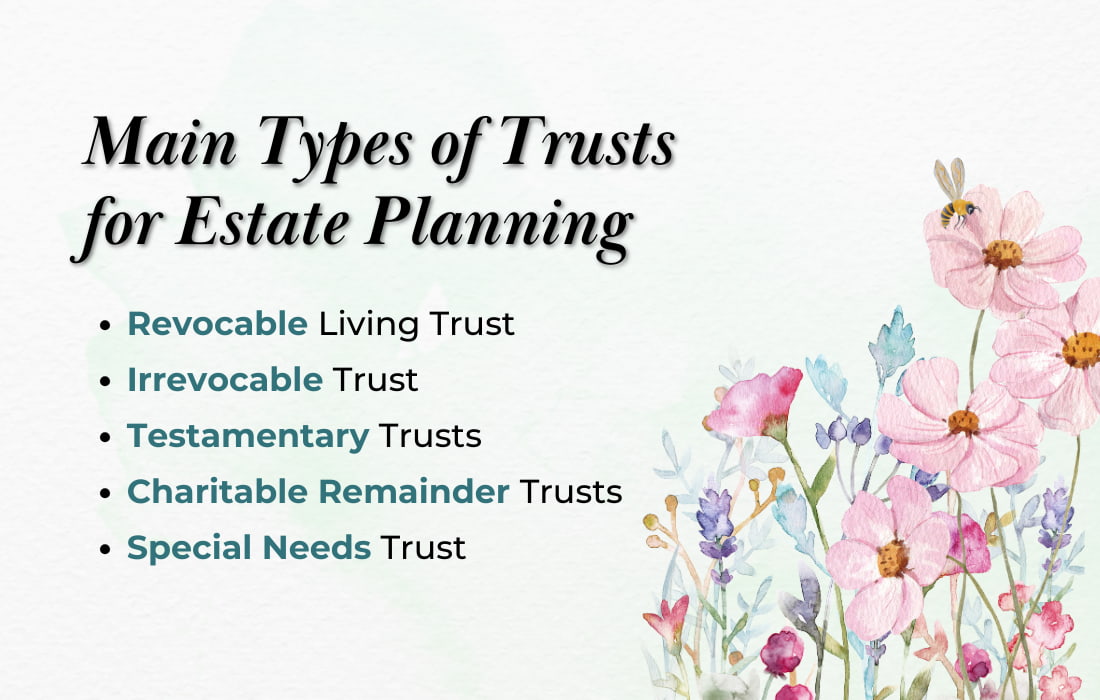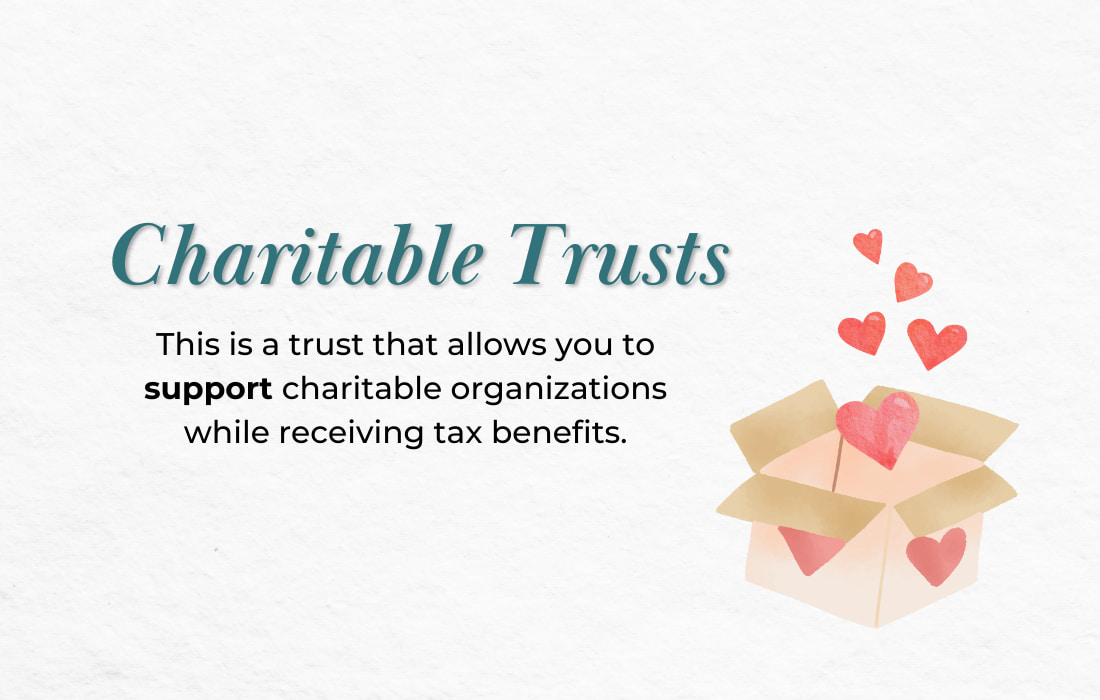The Main Purpose of a Trust
Written By Tiffany Woodfield, Financial Coach, TEP®, CRPC®, CIM®
Q: What is the purpose of a trust in estate planning?
The primary purpose of a trust is to manage and protect assets for the benefit of designated beneficiaries i.e. the people you love.
A trust allows you to specify how your money and property should be handled after you pass away. And it ensures that your wishes are followed.
With a trust, you can avoid problems like excessive taxes and long court processes. A trust can also help ensure your loved ones receive support without confusion. Essentially, a trust acts like a safety deposit box. It holds valuable items, keeping everything organized and secure for the future.
Also, trusts can help avoid the lengthy probate process, offer privacy, and provide tax advantages.
In both Canada and the United States, a trust is an important estate planning tool that helps manage and protect a person’s assets.
If you’re unsure whether or not a trust is for you, keep reading!

4 Ways a Trust Can Benefit Your Estate and Beneficiaries
1. Managing and Protecting Assets
When you place assets in a trust, you transfer the title of the assets from your name to the name of the trust.
The trustee takes on the responsibility of overseeing the assets according to the trust terms. This helps safeguard the assets from creditors, lawsuits, or irresponsible spending by the beneficiaries.
For example, if a grandparent sets up a trust for their grandchild, the trustee can manage the funds until the grandchild reaches a certain age or milestone. Overall, trusts offer a structured way to protect family wealth. They also allow for flexibility in its management and distribution.
2. Reducing Taxes to Maximize Wealth Transfer
Death is a major taxable event, whether you live in Canada or the U.S.
When you place assets in certain trusts, you can avoid having these assets considered part of your taxable estate. The result? Significant tax savings.
For example, let’s say John has a successful business. He has accumulated wealth over his lifetime. Now, he wants to ensure his children get their inheritance without a large tax bill. During his lifetime, he places his business and some investments in an irrevocable trust.
If set up correctly, the business and investments won’t be part of his estate. This leads to lower taxes and more inheritance for his children.
Please note that it’s crucial that you get proper legal advice to ensure the trust works as planned.
3. Ensuring a Smooth Wealth Transfer
When you create a trust, you clearly outline how and when your assets will be distributed to your beneficiaries.
This outline makes wealth transfer easier. It cuts down on confusion and keeps family disagreements to a minimum. It also eliminates the need for a lengthy court process called probate. Probate is no fun. It takes time and creates stress for your heirs. So, avoiding probate is ideal.
For example, you can create a trust and specify that the assets should be distributed when the children reach a certain age.
You can also specify that the funds be used for a specific purpose. A trust makes it easier for families to manage wealth because there’s a structure in place that is managed by the trustee according to your wishes.
4. Providing Privacy and Control
Unlike a will, which becomes a public document during probate, a trust remains private.
The details of your assets and their distribution are not public. This allows you to keep your family’s financial matters confidential. And it reduces the chance of disputes or challenges to your wishes.
Also, when you set up a trust, you can maintain control over the assets.
You can specify the terms and conditions under which your beneficiaries will receive the assets. This helps guard against mismanagement. It makes sure your wishes are followed after you’re gone.

What are the main types of trusts that people use in Canada for estate planning?
In Canada, there are several main types of trusts commonly used for estate planning.
Below, I’ve outlined a few of the most important types of trusts.
Inter vivos Trusts: A trust created during a person’s lifetime.
Family Trust: This type of trust allows you to transfer assets to family members while minimizing taxes. For example, a parent creates a trust to hold investments and distribute income to their children in a lower tax bracket. A word of caution: these need to be structured properly to avoid being taxed in the parent’s hands.
Alter Ego Trust: The settlor (the person who puts assets into the trust) must be at least 65 years old and a resident of Canada. The settlor must be entitled to all income and capital during their lifetime. The benefit is that the assets in the trust do not go through probate and are easier to transfer to beneficiaries.
Joint Partner Trust: The settlor needs to be 65 years old. The settlor and spouse are entitled to all income and capital of the trust during their lifetime. A joint partner trust helps transfer wealth after the death of one spouse by avoiding probate.
Testamentary trust: This type of trust is established through a will that comes into effect after death. It’s often used to manage assets for minor children or dependents until they reach a certain age.
Qualified Disability Trust (QDT): This is a special type of trust designed to provide support for individuals with disabilities while ensuring they remain eligible for government benefits.

What are the main types of trusts that people use in the US for estate planning?
The main types of trusts commonly used for estate planning in the U.S. are listed below.
Revocable Living Trust: This is a type of trust created during an individual’s lifetime where they can retain control over their assets and make changes or revoke the trust at any time. The assets in this trust avoid the probate process.
Irrevocable Trust: This is a type of trust that cannot be changed or terminated once established, so the grantor needs to take careful consideration because they cannot retrieve the assets or change the terms. The benefits are protection from creditors and potential tax advantages.
Testamentary Trusts: This is a type of trust established through a will that takes effect after the grantor’s death, often providing for minor children or dependents.
Charitable Remainder Trusts: This is a type of trust that allows individuals to make charitable donations while still receiving income from the assets during their lifetime.
Special Needs Trust: This is a type of trust designed to provide for individuals with disabilities without jeopardizing their eligibility for government benefits.

When should you consider using a trust in your estate planning?
You should consider using a trust in your estate planning if you want to ensure clear and organized management of your assets after your death.
Trusts are useful if you have minor children or dependents. They let you decide how to use assets for their needs. If you own significant assets or real estate, a trust helps avoid the long probate process.
This makes transferring assets easier for your beneficiaries. Trusts can also provide tax benefits and flexibility in estate planning.
Who should I speak with about setting up a trust?
To set up a trust, you should consult with an estate planning attorney, a financial advisor, and a tax professional who specializes in trusts.
These experts can help you find the right trust for your needs. They can draft the legal documents you need and ensure compliance with relevant laws.
Get the Free Guide and Audio Meditation for Manifesting Your Dreams
Pop your email address in the form below to get my easy checklist and guide to manifesting and the guided audio meditation to help you get started.
You’ll also get one or two emails per month with the latest blog posts about abundance, wealth-building, manifesting, and creating a fulfilling life.
Read More:
💎 When to Use a Trust for Estate Planning
💎 Simple Estate Planning Checklist for Canadians
💎 What Is Estate Planning in Canada?
About the Author

TIFFANY WOODFIELD is a financial coach, cross-border expert, and the co-founder of SWAN Wealth based out of Kelowna, BC. As a TEP and associate portfolio manager, Tiffany has extensive experience working with successful professionals who want to leave a legacy and enjoy an adventurous, work-optional lifestyle. Tiffany combines extensive knowledge from her background as a financial professional with coaching and her passion for personal development to help her clients create a unique path that allows them to live their fullest potential. Tiffany has been a regular contributor to Bloomberg TV and has been interviewed by national and international publications, including the Globe and Mail and Barron’s.